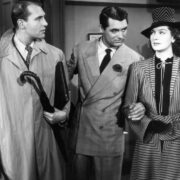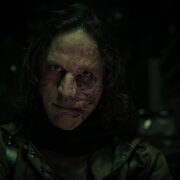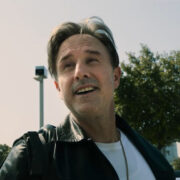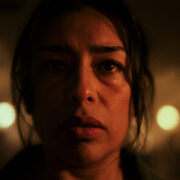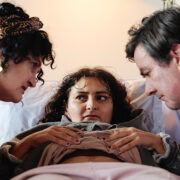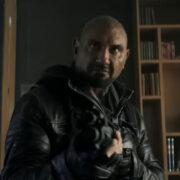BETTER OFF DEAD: A Fantastic, Horrifying Masterpiece Of Offensiveness

Danny Anderson teaches English at Mount Aloysius College in PA.…
Recently John Cusack found himself trending on Twitter for all the wrong reasons. The iconic 80’s actor retweeted (inadvertently or not) an antisemitic meme and the social media platform descended on him.
For someone so closely connected to 1980s nostalgia, Cusack is weirdly not a particularly beloved figure. He still works regularly of course, but Hot Tub Time Machine seems a bit slight given the outsized role Cusack occupies in Gen X’s collective imagination. After all, few images resonate like him in his trench coat holding his boom box over his head in Say Anything. Yet, Cusack is as much known as an irritating Chicago Cub’s fan as a beloved teen film icon these days. And his prickly personality did not lead to a pleasant outcome when the actor ran up against a politically-charged Twitter-mob.
The situation brings to my mind Cusack’s masterpiece of political incorrectness, the bizarre 1985 comedy Better Off Dead, directed by Savage Steve Holland. Even by 1980s standards, the film basks in the kinds of jokes that have not aged particularly well in our more inclusive and enlightened social environment. “Political Correctness,” the divisive concept of our time, has changed the rules about what is acceptable to say and portray in the public sphere, largely for the better.
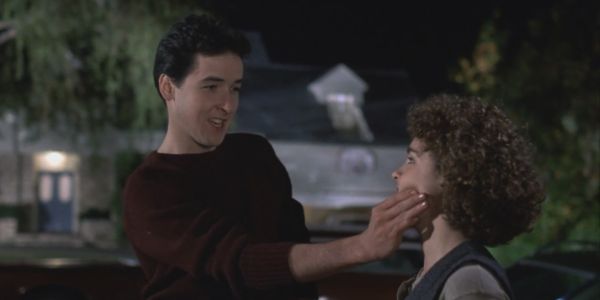
Many teen comedies from Ronald Reagan’s decade have not fared so well. Revenge of the Nerds is appalling in the #MeToo era and offers very little to anyone outside the retrograde “Incel” community. Also, much of John Hughes’s catalog makes us more than a little uncomfortable now, particularly 16 Candles. Though Molly Ringwald has expressed regret about certain elements of The Breakfast Club as well.
Better off Dead is similarly outrageous to contemporary notions of propriety. Yet somehow, the film retains a charm that many of its contemporary films cannot. This film is so bizarre that it somehow manages to be both appalling and redemptive. In short, the weird aesthetics of Savage Steve Holland‘s writing and direction allow this film to transcend its politically incorrect material. The film is both a testament to social progress and a subversive irritant that keeps our enlightenment from becoming stodgy.
The Story
The film follows Lane Meyer (John Cusack) as he navigates all the cliches of 1980s-era teen comedies. His girlfriend (Amanda Wyss) dumps him for a shallow jock (the Ted McGinley-channeling Aaron Dozier). His best friend (Curtis Armstrong) is a drug-obsessed buffoon. And his parents (David Ogden Stiers and Kim Darby) are tragically out of touch with Lane’s generation.
Lane, like many teens, suffers from a lack of self-confidence. Salvation comes in the form of Monique (Diane Franklin) the foreign exchange student trapped in the home of Meyer’s bizarre neighbors (Laura Waterbury and Dan Schneider). As Lane and Monique bond, she gives him the confidence to overcome his fears and the two end the film as happily-ever-after lovers.
Aesthetics of the Absurd
Most of these plot elements are fairly standard for a teen comedy of the era. What makes Better Off Dead distinctive is the bizarre aesthetics of Holland‘s direction, along with Cusack‘s ability to navigate the mayhem with his signature mix of charm, intelligence, and world-weariness.
Holland takes the familiar tropes of the genre and exaggerates them to incredible lengths, pushing his material fully into the realm of absurdity. For instance, dream sequences showing the main character’s detachment from his reality are standard fare in the genre. Here, however, they escalate into elaborate claymation sequences in which Lane is Doctor Frankenstein creating hamburgers that dance with French fries while singing Van Halen songs to court the affections of lady hamburgers.
Another instance of how the film twists formulas is what it does with the “precocious younger sibling,” a standard element of film and television family comedies. Here, Lane’s young brother (Scooter Stevens) doesn’t just get better grades than him in school, he builds a working space shuttle from cereal box prizes and launches it into space.
Oh, and every good teen romance needs a bully to overcome. Well, Better Off Dead provides a great one, a handsome master-skier who plays guitar and is literally named Stalin. This film assumes a massive degree of suspending disbelief.
“Gee, I’m Real Sorry Your Mom Blew Up, Ricky”
Ultimately, the film’s sheer disregard for the limits of reality makes its wholesale offensiveness tolerable. Like too many films of its era, Better Off Dead creates jokes from stereotypes, misogyny, and other terrible things. Women are made into sexual objects: cheerleader Chris Cummins not only dates the entire basketball team, she is also stripped to her underwear in the cafeteria in a roller-skating mishap.
Racial stereotypes are also at play here. One of the film’s most memorable lines is delivered by an African American tree-trimmer (Steven Williams) who, upon seeing Lane in the back of a garbage truck after a failed suicide attempt, states: “That’s a real shame when folks be throwin’ away a perfectly good white boy.”
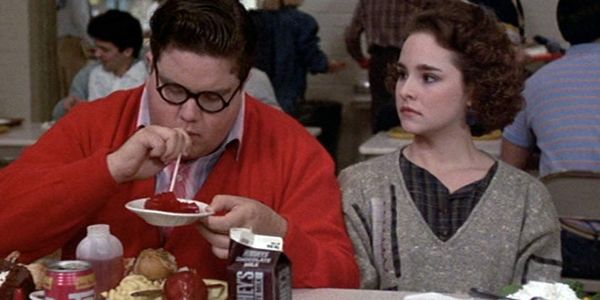
In addition, the film works in Asian stereotypes as well. Lane is frequently haunted by two Asian tormenters (Yuji Okumoto and Brian Imada) who frequently provoke him into street racing competitions. To make matters worse, the pair learned English by watching Wide World of Sports and therefore talk like Howard Cosell.
These elements would make most films unwatchable today, but this is where Holland’s surrealness saves the day. Better Off Dead takes the horrible insensitivities of its genre and explodes them into absurdity, giving us the chance to laugh, not with them, but at them.
Suicide
Better Off Dead is the movie’s title, so let’s begin there. When the Netflix series 13 Reasons Why premiered, it sparked immediate controversy about the propriety of portraying suicide on screen. This has been taboo in film for good reason, yet Holland‘s film not only depicts several suicide attempts, it does so in an effort to create comedy.
When his attempt to reconcile with Beth on Christmas Day fails, Lane attempts to asphyxiate himself by running his car in a closed garage. The tragedy and horror of this situation should not be underestimated, attempting to take one’s own life, particularly on a sacred holiday is absolutely no laughing matter. Yet, miraculously, the absurdity of the scene makes laughter possible.
As Lane loses consciousness, his hand falls on the gearshift, putting the car into reverse and sending it crashing through the doors. All of this just as his father presents the newly fixed doors (each window had been broken by the maniacal local paperboy – one of the film’s surreal running jokes) as a Christmas present to his mother. His father’s stunned reaction (bizarrely aimed more at frustration about the doors than Lane’s suicide attempt) takes the edge off the tragedy, making uncomfortable humor possible.
Lane’s final attempt at killing himself finds him preparing a death by immolation by dousing himself with primer and setting himself ablaze, a horrific idea by any standard. Yet once again, Holland‘s script employs outrageousness to allow us to laugh at Lane and his terrible idea. Interrupted before he can douse himself, Lane is ushered to the dinner table as his bizarre neighbors, Ricky Smith and his mother have been invited over to introduce the French foreign exchange student they are “hosting.”
The obnoxious Mrs. Smith drinks Lane’s primer, thinking that it’s liquor, and promptly lights up a cigarette, causing a massive explosion. The scene cuts to Lane, Ricky, and Monique in a car the next day and Lane flatly states “Gee I’m real sorry your mom blew up, Ricky.” The sequence’s ridiculousness rescues it from its cruelty.
Sexual Slavery and The Revenge of the Nerds
A happy outcome of this scene is that Lane and Monique begin their redemptive relationship here. Not only does this mark the end of Lane’s obsession with ending his life, it is also how Monique is liberated from one of the film’s most jaw-droppingly offensive sub-plots.
Ricky Smith is, to be blunt, a creepy, lecherous nerd. His mother has essentially brought a female student from another country to offer up to her son’s twisted sexual desires. There is no other way to describe this arrangement than sexual slavery. Monique is helpless, isolated, and without recourse until Lane enters the picture, and she is expected to serve Ricky’s dark desires.
Ricky’s uber-nerdiness is particularly interesting and sheds some light on how Holland‘s method of surreal exaggeration allows this film to rise above the horrible cliches of 80’s teen comedies and actually comment on them in an enlightened manner.
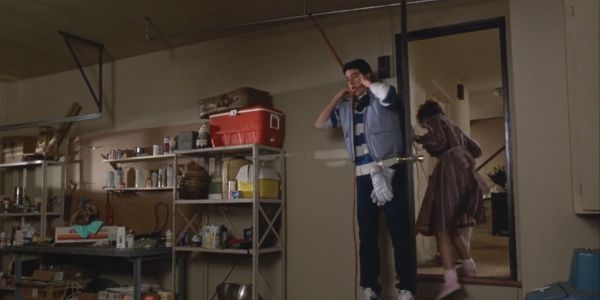
Better Off Dead was released a year after 1984’s Revenge of the Nerds. Of all the discomforting films of its decade, director Jeff Kanew‘s Animal House-inspired comedy has aged perhaps the most poorly (which is, frankly, saying something).
It is tempting to take the simplistic “slobs versus snobs” class critique of films like Animal House and make the poor, put-upon nerd the object of unquestioned sympathy, regardless of his actions. This is how Kanew and company came to create a film as utterly repulsive as Revenge of the Nerds. The nerds in question, like the Incels of Gamergate and beyond, use their social marginalization as an excuse to enact multiple acts of violence against women, including objectification and extending to literal rape. And at the time, this was apparently acceptable because, you know, snobs.
Better Off Dead stands apart from its peers in this way. It dares to punish the nerd for his sexually predatory behavior. Lane’s sexual rival, Roy, is not the final enemy Lane must overcome, it is Ricky, whom Lane defeats in a bizarre ski-slope fencing battle (of course). Holland‘s weird and extended portrait of Ricky Smith and his crimes against women stand as a direct response to the sexual politics of teen films like Revenge of the Nerds and 16 Candles.
Better Off Dead: Conclusion
Savage Steve Holland, along with Cusack and the rest of his cast, accomplish something unique with Better off Dead. At the surface, the film exhibits the same regressive political traits as many of its contemporary peers. More so, even. These films deserve much of the scorn our modern, more inclusive values place on them.
Yet Holland‘s quirky, strange film doesn’t simply rest on the traits that make those films horrifying now. It seems to identify the disturbing, underlying ideologies of the films of its time and it pushes their assumptions past their breaking points into the realm of surrealism. It is from this perspective that the film offers even the modern viewer a glimpse of the failings of the past and a map of how far we’ve come.
What do you think? Are there other films that use Political Incorrectness in productive ways?
Watch Better Off Dead
Does content like this matter to you?
Become a Member and support film journalism. Unlock access to all of Film Inquiry`s great articles. Join a community of like-minded readers who are passionate about cinema - get access to our private members Network, give back to independent filmmakers, and more.
Danny Anderson teaches English at Mount Aloysius College in PA. He tries to help his students experience the world through art. In his own attempts to do this, he likes to write about movies and culture, and he produces and hosts the Sectarian Review Podcast so he can talk to more folks about such things. You can find him on Twitter at. @DannyPAnderson.


